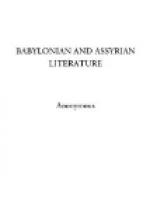And meet the bidders from all Sumir’s land;
The day that ends their maidenhood, and brings
Them joy or not. Oh, how the poor young things
With throbbing hearts approach yon gathering throng
To hear their fate pronounced; but is it wrong?
The custom old, Accadia thinks is good,
They all are young and fresh with maidenhood;
The ugly ones as well, shall husbands have,
And their young lives from shame thus they will save.
No aged maids shall pass from yonder throng
With bitterness,—their heart’s unuttered song
For some dear love to end their joyless woe,
And longings unallayed that e’er may flow.
But Love! O where art thou? art thou a thing
That gold may buy? Doth lucre thy bright wing
Unfold to hover over human hearts?
Oh, no! Thy presence to our soul imparts
A sweeter joy than selfishness can give,
Thou givest love that thou mayst love receive;
Nor asking aught of wealth, of rank, or fame.
True love in palace, hovel, is the same
Sweet joy, the holiest of sacred things.
For this we worship Ishtar, for she brings
Us happiness, when we ourselves forget
In the dear arms we love; no coronet
Of power, or countless gold, or rank, or fame,
Or aught that life can give, or tongue can name,
Can reach the heart that loyally doth love,
Nor hopes of heaven, nor fears of hell can move.
Mayhap, this Sabattu, some lover may
All wealth he claims abandon on this day,
For the dear heart that seeming pleads to him,
While her fond glistening eyes shall on him gleam.
A look, a glance; when mingling souls speak love,
Will in his breast undying longings move;
And let us hope that when the youths have lain[7]
Their all before the herald, that no men
Who see their sacrifice will rob their hearts
Of all that gives them joy or bliss imparts;
Or that this day alone will maidens see
Who have not loved, and they will happy be
With him who purchases her as his wife;
Or proud young beauties will enjoy the strife
Of bidders to secure their lovely charms,
And love may bring their husbands to their arms.
The day is sacred, dedicated old
To Love and Strength, when loving arms shall fold
A vigorous husband to a maiden’s breast,
Where she may ever stay and safely rest.
The day of Ishtar, Queen of Love! the day
Of Nergal, the strong god, to whom they pray
For strength to bless with vigor Accad’s sons.
For many anxious years this day atones.
[8]This day their Sar the flesh of birds eats not,
Nor food profaned by fire this day, nor aught
Of labor may perform nor zubat[9] change,
Nor snowy ku-bar-ra[10] anew arrange.
A sacrifice he offers not, nor rides
Upon his chariot this day, nor guides
His realm’s affairs, and his Tur-tan-nu rests.
Of soldiers, and of orders, he divests
His mind; and even though disease may fall
Upon him, remedies he may not call.
The temple he shall enter in the night,
And pray that Ishtar’s favor may delight
His heart; and lift his voice in holy prayer,
In Nergal’s temple rest from every care,
Where he before the holy altar bends
With lifted hands, his soul’s petition sends.




